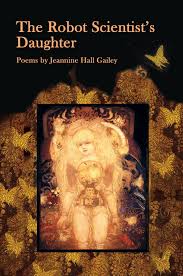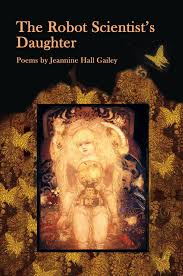As a grader of zillions of undergraduate essays, I hate the word “relatable.” I never let “universal” sneak through a poetry class without interrogation. I understand why some critics mock the word “accessible,” as if poems could be built to code with wide ramps and handrails. Relatable to whom? People don’t have equally easy entry to literature’s many universes. Asali Solomon, author of the great new novel Disgruntled, observed to me on Friday that while there’s contemporary poetry she approaches with goodwill yet still doesn’t understand, she gets the experimental work of Harryette Mullen.I’ve had similar experiences, and so have you: one kind of obliquity alienates, while another attracts, intrigues, or even makes deep sense. It’s changeable, too. A book that repels you now might be just what you need in 2025, providing we survive the zombie plague AI-takeover eco-apocalypse.
Solomon was part of a panel discussion here Thursday with Helena Maria Viramontes. (Evie Shockley was prevented from coming by what had BETTER be Virginia’s last snowstorm of 2015.) The title of the event was “At the Crossroads of Literature and History” and one question we posed to the visitors was how each thought of audience. Part of what Solomon answered, if I’m remembering right, is that she wants to involve us in the world of her West Philadelphian character Kenya, but not explain that world. That is, some readers may receive the story with delight, seeing their own experiences there, and for others the book will illuminate unfamiliar territory. But the book isn’t necessarily for one kind of reader more than another.
Now that the contract is signed-sealed-delivered, I can publicly announce that my own next book, Radioland, is scheduled for September 2015 publication by Barrow Street Press, the same folks who did a beautiful job with my second poetry collection, Heterotopia. Most of the poetry they publish seems more experimental or difficult than mine, in my own imperfect judgment: I’d say their list has an intellectual character throughout a pretty good range of styles. The editors nudge me gently, respectfully towards intensifying rather than clarifying poems, if that makes sense. I think they’re right, so as I finalize the manuscript I’m paring away a few of the first-person pronouns and other bits of language that are probably implicit. It’s like boiling down stock, only for months or years rather than a few steamy hours.
I like the book better the more time I spend with it, but I am aware that all this sauce-reduction will make the poems more challenging. I ponder the cost/ benefit analysis constantly, because I firmly believe that while playing to poetry insiders is an effective short-term game, it’s short-sighted. “Intense” is good but “off-puttingly obscure” undercuts the ultimate value of one’s own verse AND does a disservice to poetry generally. The more poets aim to please a rarefied audience, the smaller our audiences will deservedly be.
I don’t think there is a universal sweet spot for me or anyone else, as far as judging levels of difficulty. As I started off by saying, accessibility is idiosyncratic. I did just finish reading a poetry collection, though, that I could recommend to anyone. Sometimes I buy or order a very good book and then don’t pick it up for ages; it’s revealing to me that I sank into Jeannine Hall Gailey’s brand-new The Robot Scientist’s Daughter as soon as I had a free hour. Her previous three collections were good reads, sources of pleasure unalloyed by irritable puzzling, complex but not alienating, so I (rightly) trusted this would be too. 
Look at a book’s layout and much becomes clear, even if it’s only a given author’s resistance to clarity as a literary value. In this case the cover art in itself is readable; the title and subtitles imply a narrative grounding; there are discursive notes naming research sources at the back. Even more unusually, an introduction by the poet describes her upbringing near the Oak Ridge National Laboratories in Tennessee, where her father consulted on nuclear waste clean-up. Gailey situates her poems in several contexts. Her poems tell an urgent story about the long term dangers to the natural world and to human health of nuclear power. They also vividly invoke the beauty of Appalachia even as it is rendered toxic to human and nonhuman residents: I particularly loved all the natural detail about wasp nests, identifying mushrooms, brewing carcinogenic sassafras tea. Her lush green childhood seems idyllic but at so many junctures is nearly fatal. Gailey also teases out resonances between her own life and the conventions of science fiction, too, in a way that’s political and playful, for she’s obviously a fan as well as a canny critic of the genre. But I’m not a critical wizard to see these things: she signals her affiliations and commitments clearly.
I know from Gailey’s blog that it took her a long time to place this book, which strikes me as pretty weird. This collection will interest many kinds of readers, plus she’s a smart self-publicist who will do lots of readings and get the word out. She’s particularly good at drawing in audiences who are not poetry insiders. And she’s a sane and pleasant person—these qualities all seem like the ones I’d look for, if I were a book editor. Did Gailey’s investment in reaching a wide variety of readers actually make her publishing path harder, I wonder?
When I was twentyish, my poems were obscure because I wasn’t doing the work of thinking them through, or wasn’t willing to reveal what I really did think. Teaching undergraduates made me put a premium on clarity, but during the last ten years of building a poetry-publishing career I’ve felt a lot of these little nudges back towards a more elliptical voice. Force sustained through every necessary word in a brief space: I value that. But I never finish a poem now, even a highly condensed and/or formally experimental one, until I know what’s urgent about it and could state some version of the crux in simple declarative sentences. My intentions are embedded in the work. Is that my sweet spot?
I don’t know, but then, the difficulty of figuring out the best way forward is what drew me to poetry in the first place. There is no way to become expert; I will never be sure of myself.

3 responses to “Lucidity, difficulty”
[…] Wheeler writes a bit about my newest book, The Robot Scientist’s Daughter, as well as its journey to publication, and the concept of […]
LikeLike
Thank you, Lesley! And…um, from your blog to publishers’ ears?
LikeLike
This book will do really well and that should make the next one easier, too!
LikeLike